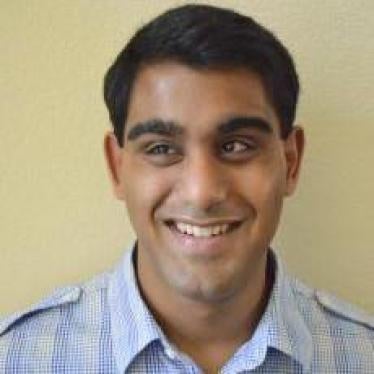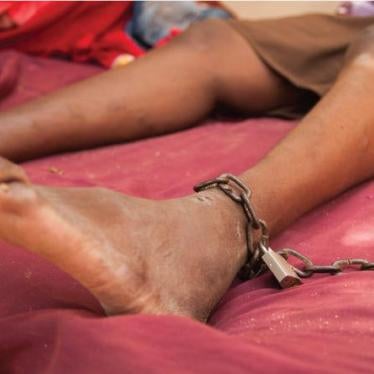Disgust, then sorrow, and finally anger flashed across my face. I blamed this deluge of sudden emotions on a New York Times article-- the white lettered headline, framed against a colorful rug and pair of shackled feet, declared "The Chains of Mental Illness in West Africa." This piece, authored by Benedict Carey, draws upon research by Human Rights Watch to document the use of chains and shackles for people with psychosocial disabilities throughout West Africa.
A deep stigma toward disability coupled with a lack of resources and cultural beliefs around mental health conditions have contributed to the conditions for widespread abuse in West Africa. According to the article, "At last count, Liberia had just one practicing psychiatrist. Niger had three, Togo four and Benin seven. Sierra Leone had none." To fill the lacuna created by lack of formal medical treatment, religious retreats, known as prayer camps, are seemingly the only options for many families. These camps range from small family-run outlets to large, elaborate operations, often reflecting the personality and vision of the head pastor.
Shackling, often justified by a paternalistic attitude toward people with mental health conditions, has been called a form of torture by United Nations and the World Health Organization has called for an end to such "treatment." In addition to being locked up in chains for days, months, or even years, people with psychosocial disabilities - either perceived or real - are often subjected to forced treatment and beatings.
Despite the wide range of human rights abuses, oversight of prayer camps is limited and conditions deplorable. In Ghana, where Human Rights Watch surveyed eight camps, nearly all the residents were chained by their ankles to trees in open compounds, where they slept, urinated and defecated, and bathed. Aware of the abuses, the Ghanaian government has pledged to begin monitoring these camps. We now need to see how their words translate into action
Facing such systemic problems, it is easy to become cynical. To intentionally disconnect. After all, I live in New York, work in the Empire State Building, and, ultimately, retain the ability to put distance--imaginative, geographic, and cultural remove--from the devastating situation in West Africa. Acknowledging and internalizing this privilege is something I have struggled with. As a human rights activist, I am told my mandate is to bear witness and advocate for change. Yet that change, while critical and achievable, is glacially slow and takes place at the macro level. Moreover, political, economic, social forces further constrain and encumber the process. One does not have to look far to lose sight of progress.
I recently attended a meeting with Juan E. Méndez, the UN special rapporteur, or expert on torture. He updated us on his recent follow-up visit to Ghana and echoed the need for mental health and prison reform in the country. Hearing from Professor Mendez reminded me of the need for collaboration and coordination among various human rights-oriented organizations.
Then I went to Washington, D.C. and while attending the White House Fellowship's 50th Anniversary and Leadership Conference events, I heard from some of the top leaders in American government, academia, and the private sector. These included, among others, United States Attorney General Loretta Lynch and the former Solicitor General of the United States Theodore B. Olson.
At a White House reception, President Obama noted the vital importance of the White House Fellowship, and went on to describe the change fellows bring to their communities following their year of service. After his speech, the president walked the rope line and a few of us were able to shake his hand. I thanked him for his leadership to which he responded, "Thank you so much, and make sure you keep doing what you're doing."
This week, Human Rights Watch released an 81- page report on abuses against people with mental health conditions and psychosocial disabilities in the semi-autonomous region of Somaliland, in northern Somalia, highlighting the importance of mental health services in post-conflict situations. The researchers found that men there with perceived or actual psychosocial disabilities are also locked up in chains, and suffer from beatings, involuntary treatment, and overcrowding in private and public health centers. Most are held against their will and have no possibility of challenging their detention. I was reminded again of that New York Times headline--this month had come full circle.
The last month has forced me to think deeply about the nature and scope of human rights work. A harsh reality is that change does not come in direct proportion to the level of effort or force of will. There is no guarantee that systems will alter or practices progress. I can live with that. From visceral front-page photographs to black tie galas with the nation's top leaders, the past month has shown me this: we fail by giving up. Ankles and hands are still bound in chains, so we have no choice but to continue advocating, and be brave in the attempt.









